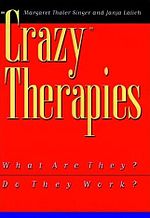- Crazy Therapies (book)
-
Crazy Therapies 
Crazy TherapiesAuthor(s) Margaret Singer
Janja LalichCountry United States Language English Subject(s) psychology Genre(s) nonfiction
psychologyPublisher Jossey-Bass Publication date September 27, 1996 Media type Hardcover Pages 263 ISBN 0-7879-0278-0 OCLC Number 34699480 Dewey Decimal 616.89/14 20 LC Classification RC480.515 .S56 1996 Preceded by Cults in Our Midst Followed by Bounded Choice Crazy Therapies: What Are They? Do They Work? is a nonfiction book by psychologist Margaret Singer, Ph.D. and Janja Lalich, Ph.D., published by Jossey-Bass in 1996. The work explores a myriad of wildly controversial claims often made in the psychotherapeutic industry.
Contents
Advice for psychotherapy patients
The book's intended audience is psychiatric and psychotherapy patients. It discusses a list of severe warning signs that psychotherapy patients should avoid, regardless of the psychotherapist's credentials, or reputation. These are discussed in detail, and quantified into ten classic behaviour patterns, which include: potential sexual abuse, asking the patient to perform menial chores, discussing the psychotherapist's problems in detail, asking the patient to cut off relations with friends and family, diagnosing the patient's condition before thoroughly discussing the issue, claiming the patient must be hypnotized in order to sort through past memories, treats patients as if they all have the same psychological root cause of illness, claiming to have a magical miracle technique, utilizing a checklist to find out if the patient suffers from an illness that the psychotherapist specializes in, and finally, demanding that the patient accept certain religious, metaphysical or pseudoscientific beliefs in order to continue psychotherapy.
Specific therapies include those which espouse beliefs in possession by spirit entities, past-life regression, alien abduction, primal screaming and other unverified cathartic therapies, reparenting, rebirthing, neurolinguistic programming (NLP), facilitated communication (FC), Eye Movement Desensitization and Reprocessing (EMDR), Neural Organization Technique (NOT) and a host of other unscientific notions"". [1]. The above crazy therapies are also included in Singer's and Lalich's book "Cults in our Midst".
According to Margaret Singer and Janja Lalich (1997:167) "Crazy therapies" are promoted using several techniques. “One is to start a certification program soon after conjuring up a new procedure” and “another is to seduce customers with rash promises and endorsements from acolytes and sycophants.” Singer and Lalich (1997:195) advise that if your therapist is saying “I don’t understand it but it sure does work” you're possibly in for trouble. Or if he’s answering your questions with a lot of jargon you don’t understand, insist on straightforward explanations. Or if he’s telling you that its tried and true, do some independent research and find out what the critics are saying”. “In many cases such fad therapies are promoted by people who are (1) imposing an agenda that may not fit your needs and (2) abandoning testing and science. Well meaning as they may be, remember, its your emotions and your pocketbook that are being played with”.[2]
Reception
The book was reviewed by Dr. Philip Zimbardo, who wrote in Behavioral Intentions that the book revealed situations in which therapists can become "persuasive agents of destructive influence."[3].
Carroll stated that the book describes "..surreal pseudoscience at its worst."[1] He added that Singer and Lalich had helped to expose "..some of the worst psychotherapy has to offer."[1]
According to Norcross et al. (2006) "the burgeoning evidence based practice movement in mental health attempts to identity, implement, and disseminate treatments that have been proven demonstrably effective according to the empirical evidence". Crazy Therapies is one of a few books by evidence based practitioners that has exposed the pseudoscience and quackery within the psychotherapy field[4]. The stance is one of scientific skepticism, and examines how unvalidated treatment have. It is a difficult task to identify what works, perhaps it is more useful to identify what does not work. A poll was conducted of experts opinions on a range of treatments they rated them from "not at all discredited" to "certainly discredited". Examples of rated as almost certainly discredited psychotherapies were also included in Crazy therapies such as angel therapy, the use of pyramid structures, orgone therapy, and crystal healing.[4]
References
- ^ a b c Review, Crazy Therapies, May 29, 1997, Robert Carroll.
- ^ Singer, Margaret & Janja Lalich (1997). Crazy Therapies: What Are They? Do They Work?. Jossey Bass, p167-195. ISBN 0787902780.
- ^ Zimbardo, Philip, Behavioral Interventions, April 2001, [1]
- ^ a b Norcross, JC, Garofalo.A, Koocher.G. (2006) Discredited Psychological Treatments and Tests; A Delphi Poll. Professional Psychology; Research and Practice. vol37. No 5. 515-522 doi:10.1037/0735-7028.37.5.515
External links
- longer book review, skepdic.com
- Excerpted segment - The Therapeutic Relationship, ICSA
- The Etiology of a Social Epidemic, book cited, September 2004
- EMDR and Mesmerism: A Comparative Historical Analysis[dead link], book cited in 1999 Harvard University journal article
See also
Categories:- 1996 books
- Psychology books
Wikimedia Foundation. 2010.
